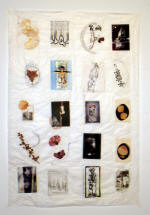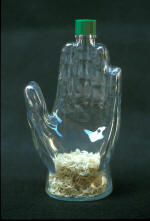University
Communications
Office
Arkansas State University
Jonesboro,
Arkansas
Staff
Markham Howe
Sara McNeil
Gina Bowman
(870) 972-3056
fax (870) 972-3069
More information:
NewsPage
Links to News Releases
& Announcements
Campus Calendar
Public activities at ASU
Campus News
Faculty and Staff
achievements
About
ASU
Overview, history
and more |
Bradbury Gallery opens season with 'Confluence:
Work by Gayle Pendergrass and John Salvest'
Aug. 22, 2008 --
Arkansas
State University’s Bradbury Gallery will present its opening exhibition
for the fall semester, “Confluence: Work by Gayle Pendergrass and John Salvest.” This bi-annual event is one in a series featuring two members
from the ASU Department of Art. The opening reception will be held
Thursday, Aug. 28, at 5 p.m. The Bradbury Gallery is located in ASU’s
Fowler Center, 201 Olympic Drive, Jonesboro. “Confluence” runs through
Friday, Sept. 26.
Pendergrass, a professor of art education in the Department of Art, will
be exhibiting several new pieces. Her mixed media works are created by
the use of a variety of materials and techniques and by the application
of objects and images such as print transfers, found objects, drawings,
and paintings onto paper and fabric.
In discussing her new work, Pendergrass says, “I started working on the
“Samplers” as an outgrowth of my interest in sewing and in alternative
sorts o f prints. I had been working with combining seemingly unrelated
images and objects, and most of my work has had a mixed media component,
so those weren’t new features. I had no preconceived idea as to content.
As I worked through several of these “Samplers,” I began to understand
what the combinations of images were about. I discovered the meanings of
the pieces. Until that point, I had not realized the extremely personal
nature of the “Samplers.” My intent is that they are not so personal as
to exclude anyone who sees them.” f prints. I had been working with combining seemingly unrelated
images and objects, and most of my work has had a mixed media component,
so those weren’t new features. I had no preconceived idea as to content.
As I worked through several of these “Samplers,” I began to understand
what the combinations of images were about. I discovered the meanings of
the pieces. Until that point, I had not realized the extremely personal
nature of the “Samplers.” My intent is that they are not so personal as
to exclude anyone who sees them.”
She comments about her renderings of the items she has collected by
stating, “Some objects are simply beautiful. On their own they are
perfect. They need nothing else to complete their aesthetic value. Most
of these objects exist in nature, though a few are man-made. When I
started the piece entitled “Beautiful Objects,”
my plan was to complete
my collection of objects, display them simply, and then create images of
each of them for the accompanying piece. I observed that an egg is
beautifully perfect, but an image of an egg is less so. The image needs
something else – some change or addition. This holds true for the other
objects as well.”
The drawings and her collected objects will be included in the
exhibition along with several photo-based works. These color
transparencies, montages, and prints are beautiful little reminders from
Pendergrass’ life. She says of the photos, “I’ve sought a quiet attitude
…these images express the introspection of a soul in repose.”
Salvest, a professor of art, teaches sculpture at ASU. He has chosen to
exhibit a selection of work that he has created over the span of years
he has been at ASU. Much of his work is made of found and collected
materials that he constructs into sculptural objects and installations.
One of his oldest works in the exhibition is an on-going piece titled
“Reliquary.” He explains this piece “is a work in progress begun in
1990, around the time I started teaching sculpture at Arkansas State
University.” He states that “Reliquary,” which is constructed from a
found glass hand and his own fingernail clippings, “began as a satirical
homage to my Catholic upbringing and its odd history of venerating
saint’s bones and splinters from the true cross, as well as an ironic
commentary on the absurdly elevated status sometimes applied to artists
in the modern era.” satirical
homage to my Catholic upbringing and its odd history of venerating
saint’s bones and splinters from the true cross, as well as an ironic
commentary on the absurdly elevated status sometimes applied to artists
in the modern era.”
He continues, “Every two weeks or so for the past eighteen years I have
sat before the hand, opened its bright green lid, and dropped my
freshly-clipped nails through its middle finger. Like an overturned
hourglass, the hand is slowly but surely filled with physical evidence
of my existence. What began as a light-hearted gesture has evolved into
something else. Each deposit of bodily detritus into the jar is a
bittersweet exercise. Generally speaking, we take satisfaction in the
conclusion of our work, but in this case the completion date is unknown
and not eagerly anticipated. “Reliquary” will only be finished when I
am. With each passing year this habitual meditation on mortality has
taken on added meaning as family, friends, and pets have been physically
subtracted from my life.”
Salvest concludes, “Each of our lives is a work in progress. What you
see in the gallery is selected evidence of a significant part of mine
with some of its thoughts, feelings, and preoccupations, the same part
represented perhaps more succinctly by the accumulation of scaly
remnants in a glass hand.”
Bradbury Gallery hours are 12 noon-5 p.m. Tuesday-Saturday and 2-5 p.m.
Sunday. The gallery is closed on Monday. The exhibition and the
reception are free and open to the public. For additional information,
please contact Les Christensen, director of the Bradbury Gallery, at
lchristensen@astate.edu, or
call the Bradbury Gallery at (870) 972-2567.
###
|
